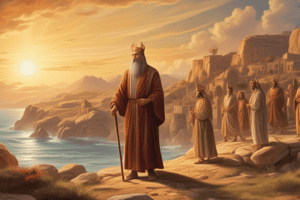Podcast
Questions and Answers
Which notable figure co-founded the Sisters of St Joseph and became Australia’s first saint?
Which notable figure co-founded the Sisters of St Joseph and became Australia’s first saint?
- Caroline Chisholm
- Saint Mary MacKillop (correct)
- Archbishop Daniel Mannix
- Pope John XXIII
The Second Vatican Council was held during the 1980s.
The Second Vatican Council was held during the 1980s.
False (B)
What did Archbishop Daniel Mannix advocate for in addition to Catholic rights?
What did Archbishop Daniel Mannix advocate for in addition to Catholic rights?
Irish independence
Caroline Chisholm is known for her work with ______ and families.
Caroline Chisholm is known for her work with ______ and families.
Match the following concepts with their descriptions:
Match the following concepts with their descriptions:
What was the primary outcome of the Council of Nicaea?
What was the primary outcome of the Council of Nicaea?
The Edict of Milan declared that Christians should be persecuted for their beliefs.
The Edict of Milan declared that Christians should be persecuted for their beliefs.
Who was one of the first Catholic priests in Australia who advocated for Catholic rights?
Who was one of the first Catholic priests in Australia who advocated for Catholic rights?
The __________ represents the split in Christianity that occurred in 1054, dividing it into Roman Catholic and Eastern Orthodox branches.
The __________ represents the split in Christianity that occurred in 1054, dividing it into Roman Catholic and Eastern Orthodox branches.
What was one of the main focuses of the Reformation during the 16th century?
What was one of the main focuses of the Reformation during the 16th century?
Match the following early Australian Catholic figures with their contributions:
Match the following early Australian Catholic figures with their contributions:
The Council of Jerusalem concluded that Gentile converts must follow all Jewish practices.
The Council of Jerusalem concluded that Gentile converts must follow all Jewish practices.
What theological principle was emphasized in Protestantism during the Reformation?
What theological principle was emphasized in Protestantism during the Reformation?
Flashcards are hidden until you start studying
Study Notes
The Early Christian Church
- The Council of Nicaea (325 CE) convened by Emperor Constantine resolved disputes regarding the nature of Christ and his relationship with God the Father, leading to the creation of the Nicene Creed, a fundamental statement of Christian belief.
- The Council of Jerusalem (circa 50 CE) addressed the question of whether Gentile converts needed to observe Jewish laws. The conclusion — that Gentile converts were not obligated to adhere to all Jewish practices — expanded Christianity's reach beyond Judaism.
- The Edict of Milan (313 CE) granted religious tolerance throughout the Roman Empire, ending the widespread persecution of Christians and marking the emergence of Christianity's prominence in Roman society.
The Development of the Christian Church
-
The Great Schism of 1054 CE separated the Christian Church into the Western (Roman Catholic) and Eastern (Eastern Orthodox) branches, primarily due to theological and political differences, particularly concerning the authority of the Pope.
-
The Reformation of the 16th century, driven by figures such as Martin Luther, challenged Catholic practices, leading to the rise of Protestantism. The movement focused on issues such as church corruption and the sale of indulgences, resulting in the emergence of new Christian denominations.
-
Catholicism: Centralized leadership under the Pope, sacraments as a means of grace, and a reliance on both scripture and tradition for guidance.
-
Orthodoxy: Emphasis on tradition and liturgy, without a centralized authority figure like the Pope.
-
Protestantism: Belief in Scripture as the sole authority (sola scriptura) and salvation through faith alone, resulting in various denominations with diverse interpretations.
The Development of the Australian Catholic Church
-
Father John Therry (1790-1864): One of the first Catholic priests in Australia, he advocated for Catholic rights and helped establish various institutions.
-
Father James Dixon (1758-1840): An Irish convict priest who held the first Catholic Mass in Australia under restrictive conditions, significantly impacting early Australian Catholic worship practices.
-
Archbishop Bede Polding (1794-1877): Australia's first Catholic bishop, he established Catholic schools and supported the growing Irish Catholic population.
-
Archbishop Daniel Mannix (1864-1963): A strong advocate for Catholic rights and Irish independence, he influenced Australian politics, especially during WWI.
-
Saint Mary MacKillop (1842-1909): Co-founder of the Sisters of St Joseph, she prioritized education and social services, particularly for the underprivileged, and became Australia’s first saint.
-
Caroline Chisholm (1808-1877): Renowned for her work with immigrant women and families, she advocated for improved living conditions and employment support, particularly for the poor.
The Church Today
-
The Second Vatican Council (1962-1965), initiated by Pope John XXIII, modernized the Church, encouraging lay participation, ecumenism, and the use of vernacular languages during Mass.
-
Ecumenism: The effort to foster unity among Christian denominations, as exemplified by organizations like the World Council of Churches.
-
Interfaith Dialogue: The Church engages in respectful conversations with other faiths to promote understanding and cooperation, a concept emphasized in Vatican II's Nostra Aetate.
-
Challenges of the Australian Church Today: The Church faces declining attendance, maintaining relevance, and addressing social concerns like secularism and social justice.
Luke’s Gospel – Jesus’ Interactions with His Disciples
-
Luke's Gospel presents Jesus' interactions with his disciples, often emphasizing compassion, forgiveness, and service.
-
Jesus' teachings in Luke 10:38-42 encourage disciples to prioritize spiritual devotion, serve the poor, and uphold faith, highlighting a relationship focused on guiding them toward understanding and spreading God's message.
Studying That Suits You
Use AI to generate personalized quizzes and flashcards to suit your learning preferences.




